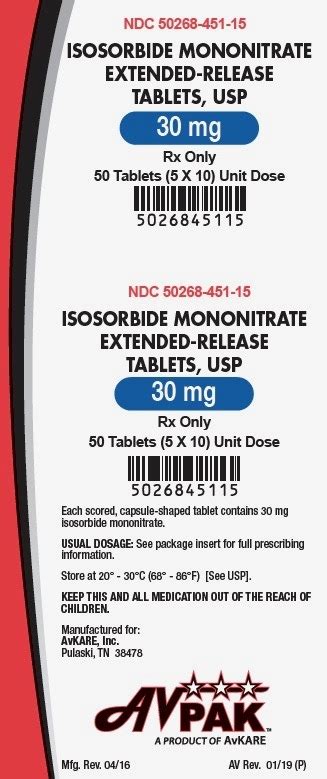Intro
Discover the uses, side effects, and dosage guidelines for Isosorbide Mononitrate ER, a medication used to prevent angina attacks. Learn how this nitrate works, its benefits, and potential interactions. Get informed about the proper dosage, administration, and precautions to ensure safe and effective treatment for your heart health.
Isosorbide mononitrate, also known as Isosorbide Mononitrate ER, is a medication that belongs to the class of nitrates. It is commonly used to prevent angina attacks, which are episodes of chest pain or discomfort that occur when the heart muscle does not receive enough oxygen-rich blood. In this article, we will delve into the uses, side effects, and dosage guide of Isosorbide Mononitrate ER.
What is Isosorbide Mononitrate ER?
Isosorbide mononitrate is a nitrate medication that works by relaxing the blood vessels and increasing blood flow to the heart muscle. This helps to reduce the amount of oxygen the heart muscle needs, thereby preventing angina attacks. Isosorbide Mononitrate ER is an extended-release formulation, which means it releases the medication slowly over a period of time, providing a longer duration of action.

Uses of Isosorbide Mononitrate ER
Isosorbide Mononitrate ER is primarily used to prevent angina attacks. It is not used to treat angina attacks that have already started. The medication is usually prescribed for people who experience frequent angina attacks, and it can help to reduce the frequency and severity of these attacks.
How Does Isosorbide Mononitrate ER Work?
Isosorbide mononitrate works by releasing nitric oxide, a molecule that relaxes the smooth muscle in blood vessels. This relaxation of blood vessels leads to an increase in blood flow to the heart muscle, reducing the amount of oxygen it needs. As a result, the heart muscle is able to function more efficiently, reducing the frequency and severity of angina attacks.
Benefits of Isosorbide Mononitrate ER
The benefits of Isosorbide Mononitrate ER include:
- Reduced frequency and severity of angina attacks
- Increased exercise tolerance
- Improved overall quality of life
- Convenience of extended-release formulation
Side Effects of Isosorbide Mononitrate ER
While Isosorbide Mononitrate ER is generally well-tolerated, it can cause some side effects. The most common side effects include:
- Headache
- Dizziness or lightheadedness
- Flushing or reddening of the skin
- Nausea or vomiting
- Weakness or fatigue
Serious Side Effects of Isosorbide Mononitrate ER
While rare, Isosorbide Mononitrate ER can cause some serious side effects, including:
- Hypotension (low blood pressure)
- Tachycardia (rapid heart rate)
- Syncope (fainting)
- Allergic reactions
Dosage Guide for Isosorbide Mononitrate ER
The dosage of Isosorbide Mononitrate ER varies depending on the individual and the severity of their angina. The typical starting dose is 30-60 mg once daily, taken in the morning. The dose can be adjusted as needed to achieve the desired response. It is essential to follow the dosage instructions carefully and not to exceed the maximum recommended dose.
Precautions and Contraindications
Before taking Isosorbide Mononitrate ER, it is essential to inform your doctor about any medical conditions you have, including:
- Hypotension or orthostatic hypotension
- Heart failure
- Recent heart attack or stroke
- Allergies to nitrates or other medications
Isosorbide Mononitrate ER is contraindicated in people with:
- Severe hypotension or shock
- Acute myocardial infarction (heart attack)
- Right ventricular infarction (heart attack affecting the right ventricle)
Interactions with Other Medications
Isosorbide Mononitrate ER can interact with other medications, including:
- Phosphodiesterase inhibitors (e.g., sildenafil, tadalafil)
- Vasodilators (e.g., hydralazine, minoxidil)
- Beta blockers (e.g., atenolol, metoprolol)
Frequently Asked Questions
What is the difference between Isosorbide Mononitrate ER and other nitrate medications?
+Isosorbide Mononitrate ER is an extended-release formulation, which means it releases the medication slowly over a period of time, providing a longer duration of action compared to other nitrate medications.
Can I take Isosorbide Mononitrate ER with other medications?
+It is essential to inform your doctor about any medications you are taking before starting Isosorbide Mononitrate ER. Your doctor will advise you on any potential interactions and adjust your treatment plan accordingly.
What are the signs of an allergic reaction to Isosorbide Mononitrate ER?
+Signs of an allergic reaction to Isosorbide Mononitrate ER include hives, itching, swelling, and difficulty breathing. If you experience any of these symptoms, seek medical attention immediately.
In conclusion, Isosorbide Mononitrate ER is a medication that can help prevent angina attacks by increasing blood flow to the heart muscle. While it is generally well-tolerated, it can cause some side effects, and it is essential to follow the dosage instructions carefully and inform your doctor about any medical conditions or medications you are taking. If you have any questions or concerns about Isosorbide Mononitrate ER, consult with your doctor or pharmacist.

